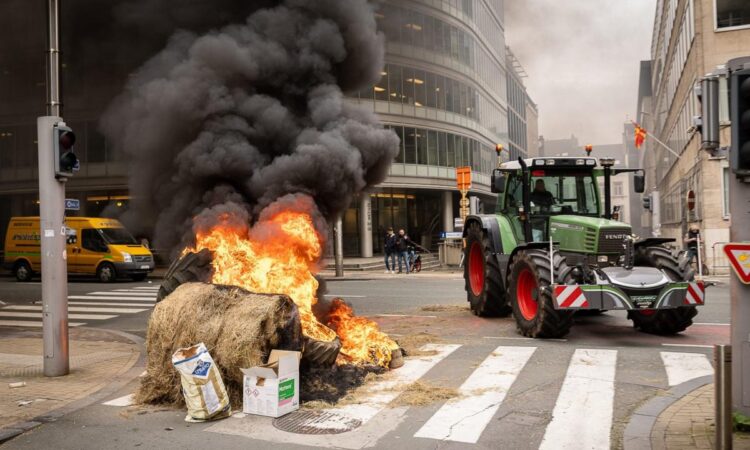The EU nearly green-lit a major climate change bill—but now, it faces an indefinite deadlock from the impact of farmers’ protests

Large-scale farmers’ protests have shaken European countries, from Germany to Poland, since the start of the year.
They’ve raised concerns over a range of topics, from reductions in fuel subsidies, to competition and tough environmental regulations.
The impact of the protests has reverberated throughout the entire region such that it’s now stymied a European Union plan to address climate change that’s been in the works for months.
On Monday, ministers from the bloc of 27 nations were meant to approve a nature restoration bill. But ultimately, after Hungary walked back on its support for what could’ve been one of EU’s biggest environmental policies, the nearly green-lit plan was indefinitely postponed.
The farmers’ protests were the main reason for Hungary’s decision to back out of the biodiversity bill, reflecting how deeply they impact policymaking in Europe.
“The agricultural sector is a very important sector, not only in Hungary, but everywhere in Europe,” Aniko Raisz, Hungary’s state secretary for environment, told reporters, adding that costs were another concern for the country.
Some countries that have faced protests recently were among those that either opposed or planned to abstain from the vote, including Italy, Belgium and Poland.
The farmers’ protests that swept Europe were a culmination of several factors such as extreme weather conditions, cheap foreign imports and lopsided subsidy cuts. Farmers’ margins had been squeezed and geopolitical tensions linked to the Ukraine war exacerbated problems by hiking energy prices. With a number of tensions piling up, farmers ultimately took to the streets and blocked highways and border crossings to voice their concerns.
Agriculture is central to European economies—but the industry, more broadly, is also responsible for roughly 30% of global greenhouse gas emissions. For the EU, that means a delicate balancing act as it tries to regulate the industry to achieve climate targets while also ensuring farmers are paid fairly.
The European farmers’ lobby group Copa-Cogeca has called for a relaxation in environmental laws, such as those on fertilizers. Earlier this month, the European Commission nudged member countries to consider watering down some of environmental rules that could offer farmers respite while still working towards new reforms.
What would the EU law have done?
The biodiversity law, if passed, set a lofty target for member nations of the EU to flip 30% of the region’s habitat that’s in poor condition by 2030. By 2040, the goal was to increase the share of restored habitats to 60%. A deadlock on the bill also throws a wrench in Europe’s plan to become a climate-neutral single economy by 2050.
This could pan out in different ways across Europe, but fundamentally, farmers could risk losing agricultural land in the process of its restoration.
The path forward for the bill looks murky with pressures from the agriculture industry prompting countries to hold back their votes. The timing is especially tricky given the EU parliamentary elections are due in June. But if the EU hopes to march forward with its sustainability targets, its members will have to reconsider the bill sooner rather than later.
“How could we give that up? How could we say ‘We decided not to restore nature,’” Irish environment minister Eamon Ryan said, according to the Associated Press, adding that a failure to approve the bill was a “shocking statement to the rest of the world.”
“You cannot put climate change to one side and forget nature restoration,” Ryan said.
This story was originally featured on Fortune.com






